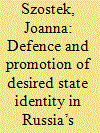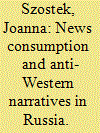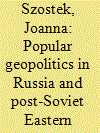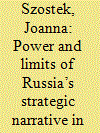|
|
|
Sort Order |
|
|
|
Items / Page
|
|
|
|
|
|
|
| Srl | Item |
| 1 |
ID:
155456


|
|
|
|
|
| Summary/Abstract |
This article examines how the Russian state promotes and protects its preferred self-identity, using the conceptual framework of ‘strategic narrative’. Nation branding practices, including state-funded ‘mega-projects’ like the Sochi Olympics, have contributed to the narrative by characterising Russia as a welcoming, attractive destination. However, a more salient feature of Russia’s strategic narrative is intense ‘anti-Western’ and ‘anti-American’ political and media discourse, formulated to defend against rival, threatening narratives projected from other countries. Through analysis of official statements and state television content, this article demonstrates how determination to protect ‘great power’ and ‘European’ identities underlay Russia’s strategic narrative in 2014. It considers responses which the narrative has prompted, arguing that desired results in domestic reception have been achieved at the expense of unsatisfactory results internationally. Heavy-handed attacks on the identities of other states boost collective self-esteem among Russian citizens, but they fail to produce – and arguably obstruct – desired responses among foreign audiences.
|
|
|
|
|
|
|
|
|
|
|
|
|
|
|
|
| 2 |
ID:
151830


|
|
|
|
|
| Summary/Abstract |
This essay investigates the relationship between habits of news consumption and geographical imaginations in Russia. It uses results from a survey of students at a Moscow university to demonstrate an association between the news sources used by respondents and their acceptance of the Russian authorities’ narrative about the West. Students who used at least one state-aligned news source were inclined to express greater agreement with the official (negative) narrative about the West than students who did not use any state-aligned news sources. However, some of the Russian authorities’ anti-Western claims resonated strongly even amongst the non-users of state-aligned sources.
|
|
|
|
|
|
|
|
|
|
|
|
|
|
|
|
| 3 |
ID:
151824


|
|
|
|
|
| Summary/Abstract |
Popular geopolitics refers to a subfield of Human Geography concerned with peoples’ perceptions of different parts of the world and how those perceptions are (re)produced in popular culture. It addresses how certain representations of international politics are embedded and promulgated in mass media, including cartoons, comics, movies, video games, newspapers and magazines. Audience engagements with geopolitical narratives in the media are part of this focus of study.
|
|
|
|
|
|
|
|
|
|
|
|
|
|
|
|
| 4 |
ID:
153931


|
|
|
|
|
| Summary/Abstract |
Governments project strategic narratives about international affairs, hoping thereby to shape the perceptions and behaviour of foreign audiences. If individuals encounter incompatible narratives projected by different states, how can their acceptance of one narrative over another be explained? I suggest that support for the strategic narrative of a foreign government is more likely when there is social and communicative linkage at the individual level, i.e., when an individual maintains personal and cultural connections to the foreign state through regular travel, media consumption, religious attendance, and conversations with friends or relatives. The role of linkage is demonstrated in Ukraine, where a “pro-Russian, anti-Western” narrative projected from Moscow has been competing against a “pro-Western, anti-Russian” narrative projected from Kyiv. Previous accounts of international persuasion have been framed in terms of a state’s resources producing advantageous “soft power.” However, I propose a shift in focus—from the resources states have to what individuals do to maintain social and communicative ties via which ideas cross borders. In a competitive discursive environment such linkage can in fact have mixed consequences for the states involved, as the Ukrainian case illustrates.
|
|
|
|
|
|
|
|
|
|
|
|
|
|
|
|
|
|
|
|
|